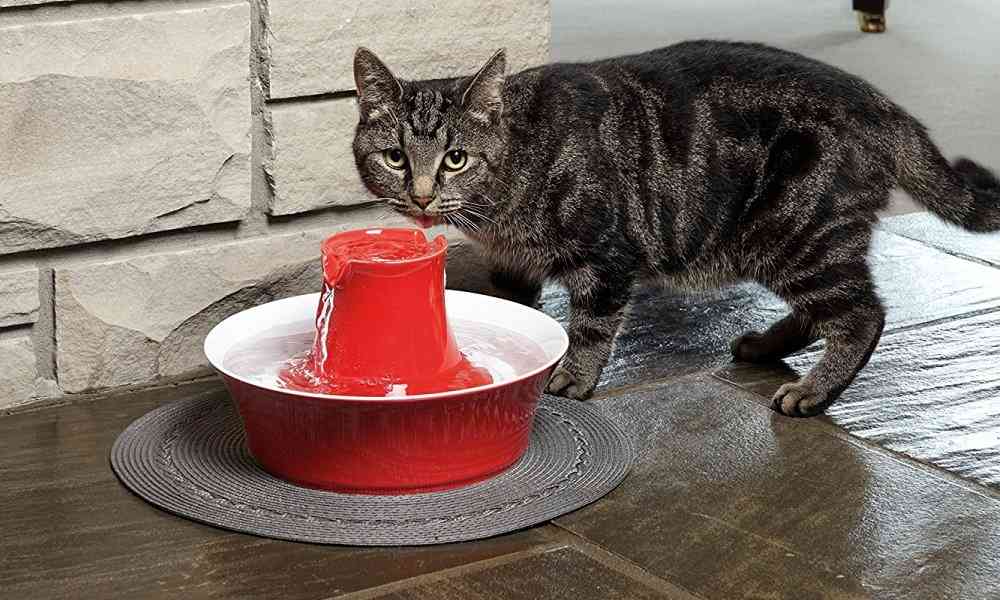But pets are hit-and-miss drinkers at the water bowl. They can leave more water on the floor than what ends up in their mouth…
It takes careful observation to see if your pet is trying to tell you something about their health, so you should learn to read the signs…
In the meantime, a pet drinking fountain can be a great way to keep them hydrated. They’re attracted to the running water… and fountains, compared to still (and stagnant) water dishes, harbor less of the bacteria that can cause serious health problems for your pets.
Not only that, they can be a pleasant feature in your home, one that you and your pets can enjoy…
Simple steps to make a pet drinking fountain
Wet pet food is up to 78% water, while dry kibble food only contributes about 10% of a pet’s water consumption. You should be making sufficient clean, fresh water available according to the diet your pet is following.
Keep in mind, they might be trying to tell you something if they’re either completely avoiding the water bowl… or draining it more often than usual.
Here’s a simple way to make your own pet fountain…
1. Choose your vessel.
This can be an ornate ceramic dish on a small pedestal, or a glass fishbowl or tank. Be sure to choose a vessel that’s between 1.5-5 gallons – depending on the size of your pet – that isn’t porous.
It should be simple to clean in your sink or dishwasher. Don’t use plastic of any kind. Be sure that if you use ceramic that it’s certified food safe.
Something that isn’t too tippy will prevent spills and damage to the container or your floors! As you know, some pups love to get their paws right into the action…
2. Purchase a fish tank pump with a filter.
Make sure the pump can handle the capacity of your tank or bowl.
It’s best to tell the store why you’re purchasing the pump… you’re looking for a fountain effect that comes from the top of the bowl and creates the sounds and sensation of a stream.
You’ll also want to be able to adjust the water flow in case it’s too strong or too weak for your vessel and quantity of water.
3. Use stones, glass beads or a bull clip to suspend the pump.
Lining your vessel with decorative rocks or glass beads from a craft or dollar store will allow debris to settle on the bottom of the dish.
Put them where your dog can’t get at any of it, and it will keep the filter at the right height.
Again, the beads and fastener shouldn’t be porous. You want something that’s smooth and easy to clean.
4. Plug your pump into a surge-protector.
Whenever you’re mixing electricity and water, it’s wise to take precautions.
Leave a downward loop in the cord between the wall plug and the fountain and be sure that if water does spill that it won’t splash or submerge the surge-protector.
You don’t want the pump to short out, or give your pet an unwelcome zap on the nose or tongue! How eager do you think they’ll be to drink water after being hurt? Not so much.
Remember that hygiene is important for your pet drinking fountain
We can’t stress this enough.
There is bacteria in your pet’s mouth that isn’t harmful to them naturally… but if it gets into their water source and has a chance to grow, it can make your pet very sick. It can even cause fatal illnesses.
You should apply good hygiene practices to all the toys and dishes your pet comes into contact with regularly. This includes their food dish – even if they’re having dry food. Bacteria in their saliva can transfer to their food dish and grow in the right light and temperature conditions if it isn’t cleaned properly.
I hear so many people joke about their dog having an “iron gut”… but there are some bacteria that can do real harm if you’re not looking out for them. And they might be feeling unwell and not be able to communicate with you about the reasons why…
Biofilm in a water dish is easy to manage. Be sure to clean the pet fountain every three days.
- Change the filter and O-ring according to the manufacturer’s instructions.
- Remove all the stones, glass beads, or anything else you’ve put in the fountain for decoration or to support the pump.
- Wash all the parts in a mild non-toxic soap solution. For tough biofilm residue, scrub the sides of the vessel with a baking soda paste, rinse thoroughly and then wash with warm water and mild soap.
- Be sure to rinse all the soap residue from the parts.
Dogs and cats and many other pets love having access to fresh running water. Pet fountains can be pricey, but you can build your own for a fraction of the cost.
Just be sure your pump is strong enough for the size of your pet and their water bowl, and that all the parts can be cleaned thoroughly.
And, if any of your pets start to behave differently around their water bowl or food dish, be sure to listen to them carefully… they could be trying to tell you they’re unwell.
